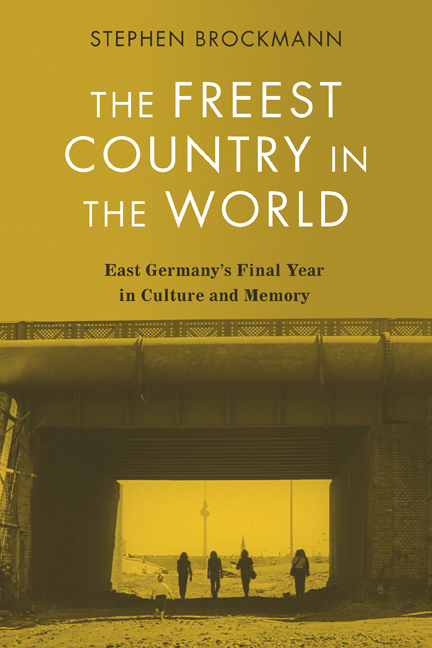Book contents
- Frontmatter
- Dedication
- Contents
- Acknowledgments
- Introduction: The Memory of Freedom
- 1 Protocols of History: Reunification Documentaries from 1989/1990
- 2 Anarchy in the GDR
- 3 The National Liberation Zone
- 4 Coming of Age as the State Dies: Three Novels and Their Heroes
- 5 Provincial Theater: Fiction Film Struggles to Address German Reunification in the Early 1990s
- 6 The Grand Theater of the East and the Imaginary Stasi: The Emergence of the Standard Depiction of German Reunification in Film and on Television
- 7 Ritual, Repetition, and Memory: Commemorating and Memorializing 1989/1990
- Conclusion: The Last GDR
- Selected Works Cited
- Filmography
- Index
6 - The Grand Theater of the East and the Imaginary Stasi: The Emergence of the Standard Depiction of German Reunification in Film and on Television
Published online by Cambridge University Press: 11 January 2024
- Frontmatter
- Dedication
- Contents
- Acknowledgments
- Introduction: The Memory of Freedom
- 1 Protocols of History: Reunification Documentaries from 1989/1990
- 2 Anarchy in the GDR
- 3 The National Liberation Zone
- 4 Coming of Age as the State Dies: Three Novels and Their Heroes
- 5 Provincial Theater: Fiction Film Struggles to Address German Reunification in the Early 1990s
- 6 The Grand Theater of the East and the Imaginary Stasi: The Emergence of the Standard Depiction of German Reunification in Film and on Television
- 7 Ritual, Repetition, and Memory: Commemorating and Memorializing 1989/1990
- Conclusion: The Last GDR
- Selected Works Cited
- Filmography
- Index
Summary
IN THE MIDDLE OF THE 1990s, German filmmakers began moving toward more dramatic popular forms for narrating the story of 1989 and 1990. These popular forms gave accounts of the GDR's collapse and the fall of the Berlin Wall that could appeal to the tastes of broader film and television audiences, both domestically and internationally. The move toward popularity and standardization in the second half of the 1990s required a number of changes.
From the perspective of popularity and audience appeal, there were several problems with fiction film narratives and documentaries made in the early 1990s about the momentous events that had recently occurred in eastern Germany. First and foremost, most of the fiction film narratives created prior to 1994 lacked an exciting narrative arc. Andreas Dresen's Stilles Land, for instance, showed a group of people in a small provincial town waiting aimlessly while history happens elsewhere. Dresen's depiction of stasis at a moment of radical political change, as authentic as it may have been, was hardly designed to appeal to large numbers of film viewers looking for excitement and entertainment.
Helmut Dziuba's Jana und Jan, meanwhile, featured as protagonists two juvenile delinquents who had no interest in German or world history. The film's protagonists were more concerned with their own personal situation, in particular their budding love for each other. Peter Timm's comedy Go Trabi Go did not, for the most part, even take place in Germany and was not about the collapse of the GDR. Its sequel, Das war der wilde Osten, directed by Wolfgang Büld and Reinhard Klooss, also did not address the collapse of the GDR but rather constituted a comic sendup of land speculation and corruption in the post-unification period. Das war der wilde Osten hit a sensitive target in its humorous spoofing of land speculation in the post-unification period. With a protagonist specifically configured as an ordinary eastern everyman and more than its fair share of farcical humor, however, the movie failed to present recent German history and the newfound freedoms of Easterners in a heroic and uplifting way. Even in its critique of corruption, the movie was not very serious.
- Type
- Chapter
- Information
- The Freest Country in the WorldEast Germany's Final Year in Culture and Memory, pp. 226 - 265Publisher: Boydell & BrewerPrint publication year: 2023



